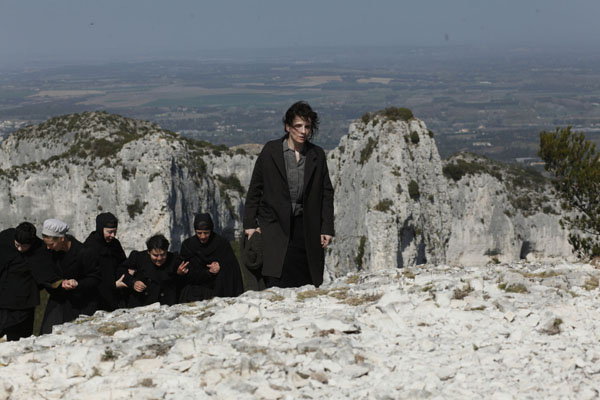“At the point where writer-director Bruno Dumont opens Camille Claudel 1915,” begins Scott Tobias at the Dissolve, “most biographies or biopics about Claudel, a sculptor in the late 19th and early 20th centuries, would be coming to an end—if not firmly in postscript. Claudel’s life ended in the church-run Montdevergues asylum, far south of her Paris home, 30 years after her younger brother Paul, a famed poet and dramatist in his own right, had her committed. The circumstances that brought her there hold the most obvious fascination: Her stormy relationship with the great sculptor Auguste Rodin—for whom she was student, model, muse, and lover—was a large part of it, compounded by her frustrations with a male-dominated art world that either resisted her work or wouldn’t acknowledge its distinction from his…. Since he first came on the scene with The Life of Jesus and L’Humanité, Dumont has narrowly specialized in contemporary, religion-inflected stories of rural primitives, nearly always played by non-actors, and the way their animal natures manifest through violence and sexuality.” Camille Claudel 1915 “seems like a departure, but soon turns into a Bruno Dumont film—and one of his most rigorous and powerful at that.”
Ignatiy Vishnevetsky at the AV Club: “Typically, Dumont’s movies build to impulsive acts—crimes, moments of forgiveness—that are steeped in mystery and symbolism; his worldview is a kind of secular mysticism where the paradoxical stands in for the divine. Camille Claudel, however, is a story of clear-cut wrongdoing and oppression, complicated only by its protagonist’s mental illness. As Paul Claudel, Jean-Luc Vincent projects robotic self-righteousness, as though his religious convictions had completely replaced his feelings…. Whatever nuance the movie has, it owes to [Juliette] Binoche’s performance; despite the material and visual context, she’s able to convey a sense of contradiction and inner life. Even her vacant stares have subtleties. Too bad the same can’t be said of Dumont’s signature long takes, which come across as a narrative-stalling tactic.”
“In contrast with Camille Claudel (1988), the Isabelle Adjani passion project in which she plays the tragic sculptor and Rodin muse and mistress, Camille Claudel 1915 forgoes epic sweep and bloat,” writes Melissa Anderson for Artforum. “But our hope that Camille Claudel 1915 will be a subtle, sober biopic quickly dissipates when it becomes clear that the writer-director has populated his docudrama with actual asylum patients, women with significant physical and mental deficiencies who are deployed not as background extras, but as ‘characters’ with important minor roles. The purpose of this act of bad faith, apparently, is to highlight Claudel’s comparative lucidity and intelligence, to emphasize the fact that her own family is keeping her incarcerated against her will. This specious authenticity, however, succeeds only in making the seams of the film visible…. If there is an instructive lesson to be found in Dumont’s film, it may be that Adjani’s version of the sculptor’s life, despite its prestige-picture trappings, is the more courageous and profound one.”
But for Time Out New York‘s Keith Uhlich, Camille Claudel 1915 is a “grippingly stark drama.” 4 out of 5 stars. It’s “one of the year’s thorniest releases,” grants Michael Atkinson in the Voice. More from Dustin Chang (Twitch), Diego Costa (Slant, 2/4), Graham Fuller (Artinfo), Stephen Holden (New York Times), Dan Sullivan (Hammer to Nail), and Kristin Thompson. And Critics Round Up spotlights several reviews that have appeared throughout the year.
Following its premiere at the Berlinale in February and a few quiet runs in France and a handful of other countries, Camille Claudel 1915 has been tripping around the festival circuit and now sees a two-week engagement, beginning today, at New York’s Film Forum.
Update: “Acting is the ability to play make believe with the same devotion that you did as a child,” writes Sheila O’Malley at RogerEbert.com. “Binoche has that. You don’t catch her calculating or creating. She simply seems to ‘be.'”
Updates, 10/17: Jonathan Romney for Film Comment: “Dumont’s career has been uneven, ranging from the spare brilliance of his debut The Life of Jesus (97), a quasi-naturalistic drama of working-class youth, to the overblown existential thriller Humanity (99), in which he seemed fatally mesmerized by the idea of his own auteur loftiness. Let’s not mention Twentynine Palms (03), a draggy, deranged remix of Zabriskie Point. Hadewijch and its successor Hors Satan (11), however, were controlled, intensely surprising minimalist narratives—and they seemed to offer a workable format for the ‘Bruno Dumont film’ that the director might have comfortably continued with indefinitely. Instead, he’s now blindsided us with Camille Claudel 1915, which is both a departure and a consolidation, in that it pushes his characteristic spareness and seriousness into emotionally charged new terrain.”
“If nothing else, Bruno Dumont’s Camille Claudel 1915 proves that a movie star really is a completely different animal than the rest of us schlubs,” writes Michael Koresky at Reverse Shot. “This is the first time Dumont has played with this sort of iconicity, moving him further away than ever from the stripped-away Bressonian model of performance, and it gives a film that might have been hopelessly austere a shocking burst of energy.”
Update, 10/23: “Given the sheer volume of Paul Claudel’s intellectual biography that Dumont provides in the film’s final third, it is fairly evident that Camille Claudel 1915 is a declarative statement disguised as a work of aesthetic ambiguity,” writes Michael Sicinski for Cinema Scope. “Paul’s religious and political beliefs, which are juxtaposed with his decision to abandon Camille to lifelong incarceration, are implicitly to blame for his sister’s fate. Patriarchy is given a name and a face, and it isn’t Auguste Rodin.” Elaborating, he explores “two interconnected errors.”
For news and tips throughout the day every day, follow @KeyframeDaily on Twitter and/or the RSS feed. Get Keyframe Daily in your inbox by signing in at fandor.com/daily.




